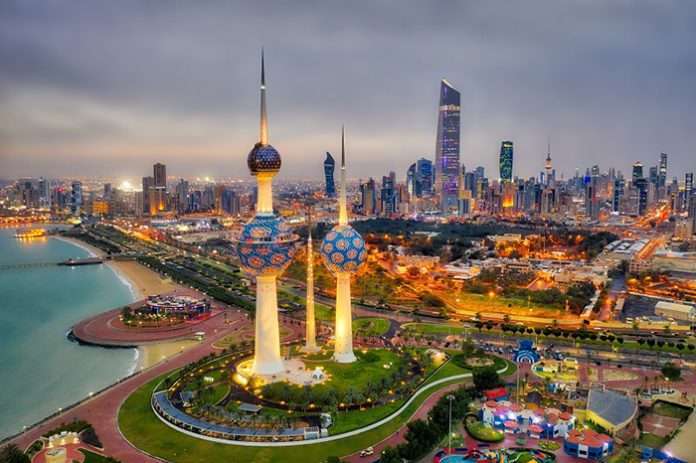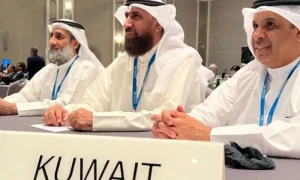Latest News
- New Direct Tax Transfer Mechanism For Vehicle Imports
- Citizen Arrested For Illicit Marijuana Farming In Salwa Apartmen...
- MoE Prioritizes Local Hiring To Address Teacher Shortage
- Court Sentences Bank Employee To 5 Years For Embezzling 100,000...
- Fake ‘Sheikh’ Sentenced To 2-yr As Court Overturns Verdict
- Justice Ministry New Service On The Sahel App
- Ministry Probes 68 Cases Of Illegal Charity, Funds Collection
- Globally, Kuwait Is Among The Top Consumers Of Incense And Oud O...
- Decrease Seen In Foreign Investment
- Kuwait Customs Seized 2 Containers Laden With Tobacco At Shuwaik...
- Unpaid Salaries, Accountant Beaten Up By Workers
- The Sahel App Was Not Hacked, A Spokesman Claims
Kuwait Ranks Fourth In Gulf In Sustainable Competitiveness Which Is Linked To Higher Incomes

Kuwait ranked fourth in the Gulf, eighth in the Arab world and 139 globally in the tenth edition of the Sustainable Competitiveness Index issued by the independent think-tank “Solability”, a consultancy firm specialized in sustainability management.
Sustainable competitiveness means current levels of wealth are not at risk of declining or shrinking through over-exploitation of resources (ie natural and human resources), or lack of innovation investments required to compete in globalized markets such as education, or discrimination, marginalization or exploitation of segments of society.
According to the report accompanying the results of the index, the leading countries in the classification of the sustainable competitiveness index are mostly high-income countries, which indicate a certain relationship between the degree of sustainable competitiveness and per capita GDP, or income levels (high income = high sustainability).
The report pointed out that the rating of Kuwait and Saudi Arabia, which are rich in natural resources, is much lower than the rating of their GDP, which indicates that sustainable competitiveness is not linked to GDP but rather to high levels of income.
The Sustainable Competitiveness Index, the Al-Rai daily said quoting sources, is based on measuring the competitiveness of 180 countries on 5 sub-indicators: the competitiveness of natural capital, social capital, intellectual capital, resource competitiveness, and governance.
The report stated that the availability and condition of natural capital affects economic development or recovery in the short term — unless the capital in question is oil or other commodities in demand in the global market. The exploitation of natural resources (natural capital) can bring short-term economic benefits, but is often accompanied by a diminishing basis for future development.
As for intellectual capital, the report explained that there is a direct relationship to some extent between the availability of intellectual capital and economic development, as all countries that reduced their investments in innovation, research and development and education, for example, have experienced a slower recovery or even more decline since the financial crisis, vice versa.
In terms of governance performance, the report stated that countries that reduced infrastructure and public investment, and countries with a large unsupervised domestic financial investment market and a low industrial base, declined more and recovered more slowly than countries with higher investment, smaller domestic financial markets and a lower industrial base. Better industrial.
Kuwait ranked very late in the natural capital index, to rank 165 globally and fifth in the Gulf, and in a low rank in resource efficiency, to the bottom of the list, with Qatar and Iran in the 178, 179 and 180 places, respectively.
In the intellectual capital index, Kuwait ranked 113 out of 180 countries, and in the social capital index, it performed well to rank 42 globally. Kuwait also came second in the Gulf after the UAE, third in the Arab world and 60th globally in the Governance Performance Index for 2021, which is based on measuring the efficiency of governance in 180 countries around the world on 5 main criteria: “government compatibility, infrastructure, business environment, corruption, and financial stability.”
SOURCE TIMESKUWAIT
Trending News
-
 Eid Al Fitr 2024: Crescent Moon Not Sighted In Sau...
08 April 2024
Eid Al Fitr 2024: Crescent Moon Not Sighted In Sau...
08 April 2024 -
 Kuwait Implements Home Biometrics Services Ahead O...
14 April 2024
Kuwait Implements Home Biometrics Services Ahead O...
14 April 2024 -
 When Will Eid Al Fitr 2024 Take Place In Qatar, Ba...
08 April 2024
When Will Eid Al Fitr 2024 Take Place In Qatar, Ba...
08 April 2024 -
 On Sunday, The Meteorological Department Warns Of...
07 April 2024
On Sunday, The Meteorological Department Warns Of...
07 April 2024 -
 Kuwait Airways Provides Update On Flight Schedule...
14 April 2024
Kuwait Airways Provides Update On Flight Schedule...
14 April 2024 -
 Kuwait Airways Introduces Convenient Home Luggage...
15 April 2024
Kuwait Airways Introduces Convenient Home Luggage...
15 April 2024 -
 Gathering For Eid Al-Fitr Prayers: Kuwaiti Citizen...
10 April 2024
Gathering For Eid Al-Fitr Prayers: Kuwaiti Citizen...
10 April 2024 -
 Winners Of Kuwait National Assembly 2024 Elections
06 April 2024
Winners Of Kuwait National Assembly 2024 Elections
06 April 2024 -
 Bay Zero Water Park Kuwait: Summer Season Opens Ei...
11 April 2024
Bay Zero Water Park Kuwait: Summer Season Opens Ei...
11 April 2024 -
 An Egyptian Expat Dies At Kuwait's Airport
11 April 2024
An Egyptian Expat Dies At Kuwait's Airport
11 April 2024












Comments Post Comment